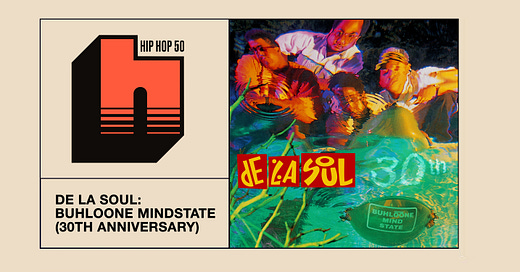Retrospective Review: Buhloone Mindstate by De La Soul
De La Soul released some of their finest work, their last effort with Prince Paul.
Rest in power, David “Trugoy the Dove” Jolicoeur.
The familiar adage highlights that triumph is a progression, not a terminus. In this context, hardly any artists have embarked on this expedition, like De La Soul, arguably the finest hip-hop group, period. Emerging as enthusiastic and raw youths from Long Island, New York, they predominantly carved up a niche in the hip-hop industry by embracing their distinctive individualities. However, maintaining authenticity can be taxing, as evidenced by De La Soul’s third album, Buhloone Mindstate, as their career seemed to take a toll on them.
The holy trinity with Trugoy the Dove, Posdnuos, and Maseo have been noted as trend-breakers from their debut album, 3 Feet High and Rising. Their layered and profound music saw minor triumphs, but the public and their record label often viewed their work superficially, perceiving them as eccentric. Tommy Boy Records, which signed the group in the late ‘80s, wished they conformed to make soundtracks with lesser depth.
Brimming with petty frustrations against the conventional record industry, this proved evident during their sophomore release—De La Soul Is Dead. Buhloone Mindstate was teetering on a precipice by its release, threatening to implode. Despite their preference for abstraction in their verses, the group always wore their hearts on their sleeves. Behind their complex rhymes hid a treasure of emotions, and there was a growing bitterness toward the industry machines that followed their rise to stardom.
This album oozes discontent, judging from the tone of the lyrics. The group seemed agitated, battling their despotic record label experience, the evolving “gangsta” genre of hip-hop, and, remarkably, a potential disintegration of the Native Tongues collective. The origins of The Native Tongues included De La Soul, A Tribe Called Quest, and the Jungle Brothers. As time passed, the collective expanded to include other artists whose affiliations varied. Meanwhile, relationships between some original members soured, severing friendships built over time.
Buhloone Mindstate presents De La as disheartened with the music industry. They appear exhausted from dealing with the twisted politics, the mind games, and the unending pressure of appealing to a larger audience. This album openly criticizes mainstream persuasion, epitomized by its opening chant, voicing their firm stance against “pop” culture. A noteworthy distinction in this album is the group’s more assertive presence in the production sector. Prince Paul has an undeniable influence, yet a more serious edge to the album reflects its themes.
Unlike their previous works, Buhloone Mindstate is more concise. It features fewer skits and lesser humor but still maintains the group’s trademark quirks, such as random messages on the answering machine and spontaneous guest appearances. Being “unhappy” does not deteriorate the album’s quality. It holds a top position in De La Soul’s body of work and remains undervalued today.
For all its simplicity, the album carries a considerable share of unreleased content related to Buhloone. “Lovely How I Let My Mind Float” and “Sh.Fe.MC’s” were relatively high-quality recordings but were excluded from the album as they would not ideally fit into the motif of Buhloone.
Buhloone Mindstate is a De La project that loyal adherents consider unmatched. The album continues to be relevant, even as the grievances that were the album’s foundations have vanished. Musical expressions have no expiration date, notably when founded on real emotions, and Buhloone Mindstate is proof of that.




